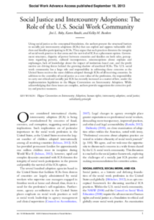Using social justice as the conceptual foundation, the authors present the structural barriers to socially just intercountry adoptions (ICAs) that can exploit and oppress vulnerable children and families participating in ICAs. They argue that such practices threaten the integrity of social work practice in that arena and the survival of ICA as a placement option. Government structures, disparity of power between countries and families on both sides, perceptions regarding poverty, cultural incompetence, misconceptions about orphans and orphanages, lack of knowledge about the impact of institution-based care, and the profit motive are driving forces behind the growing shadow of unethical ICAs.
The authors highlight evidence of fraudulent and coercive practices in the context of ICA from Cambodia, Guatemala, Vietnam, Ethiopia, Honduras, the Marshall Islands and Samoa, and argue that this has played a major role in the 62 percent decrease in the number of children arriving in the United States through ICA from 2004 to 2012, rather than difficulties in the implementation of the 1993 Hague Convention on the Protection of Children and Co-operation in Respect of Intercountry Adoption. They suggest that the structure of the process in the United States, whereby ICA is facilitated by licensed private agencies and accredited organizations operating on fees that are paid by prospective adoptive parents (PAPs), creates a demand driven orientation that increases the vulnerability of children and families in countries of origin. These parents and families may be pulled into the ICA process without full knowledge of the implications of access to alternative social services. The authors also highlight the role of ICA in the proliferation of residential care for children in some countries, with the institutions acting as “holding centers for children recruited for ICA and as fundraising venues.”
The authors argue that the U.S. social work community has a large role and responsibility in addressing these concerns as the United States receives the most children adopted through ICAs of all receiving countries. In addition to the centrality of social justice as a core value of the profession, the responsibility to carry out ethical and socially just ICA has recently increased as a matter of law, under the implementation legislation to the Hague Convention on Intercountry Adoption. While acknowledging that these issues are complex, the authors provide suggestions for corrective policy and practice measures.
©Social Work Social doi:10.1093/sw/swt033

